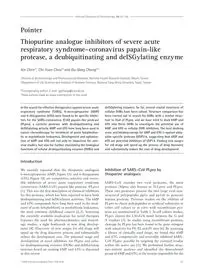
2009 Thiopurine Analogue Inhibitors of Severe Acute Respiratory Syndrome-Coronavirus Papain-Like Protease, a Deubiquitin PDF
Preview 2009 Thiopurine Analogue Inhibitors of Severe Acute Respiratory Syndrome-Coronavirus Papain-Like Protease, a Deubiquitin
© 2009 International Medical Press 1359-6535 151 Antiviral Chemistry & Chemotherapy 19:151–156 In the search for effective therapeutics against severe acute respiratory syndrome (SARS), 6-mercaptopurine (6MP) and 6-thioguanine (6TG) were found to be specific inhibi- tors for the SARS–coronavirus (CoV) papain-like protease (PLpro), a cysteine protease with deubiquitinating and deISGylating activity. 6MP and 6TG have long been used in cancer chemotherapy for treatment of acute lymphoblas- tic or myeloblastic leukaemia. Development and optimiza- tion of 6MP and 6TG will not only be important for anti- viral studies, but also for further elucidating the biological functions of cellular deubiquitinating enzymes (DUBs) and deISGylating enzymes. So far, several crystal structures of cellular DUBs have been solved. Structure comparison has been carried out to search for DUBs with a similar struc- ture to that of PLpro, and we have tried to dock 6MP and 6TG into these DUBs to investigate the potential use of 6MP and 6TG as cellular DUB inhibitors. The best docking score and binding energy for 6MP and 6TG is against ubiq- uitin-specific protease (USP)14, suggesting that 6MP and 6TG are potential inhibitors of USP14. Finding new usages for old drugs will speed up the process of drug discovery and substantially reduce the cost of drug development. We recently reported that the thiopurine analogues 6-mercaptopurine (6MP; Figure 1A) and 6-thioguanine (6TG; Figure 1B) are competitive, selective and revers- ible inhibitors of severe acute respiratory syndrome coronavirus (SARS–CoV) papain-like protease (PLpro) [1]. This was the first description of chemical inhibitors for this protease, which has been reported to have both deubiquitinating and deISGylation activities. The 6MP and 6TG compounds have long been used in the treat- ment of acute lymphoblastic or myeloblastic leukaemia, the most common childhood cancers [2,3]. Screening the currently available medication for novel therapies bypasses the need for pharmacokinetics and toxicol- ogy studies, a tight bottleneck in new drug develop- ment [4]. Discovery of new usages for old drugs will speed up the drug discovery process and substantially reduce the development cost. The potential usage and development of novel inhibitors for PLpro and cellu- lar deubiquitinating enzymes (DUBs) and deISGylating enzymes based on existing 6MP and 6TG is discussed in this review. Inhibition of SARS–CoV PLpro by thiopurine analogues SARS–CoV encodes two viral proteases, the main protease (Mpro; also known as 3CLpro) and PLpro. These two proteases process the two large viral non- structural polypeptides pp1a and pp1ab to generate mature proteins. Previous studies on the abilities of PLpro to cleave polypeptides or artificial substrates in either cell culture or in vitro with recombinant pro- teins are summarized in Table 1. In cell culture studies, PLpro cleaves the LXGG/A motif between the G and A residues [5]. In studies using recombinant proteins, cleavage by PLpro has been found to be quite stringent with selectivity for P4, P2 and P1 sites [6]. By screening a library of clinically used drugs, we found that 6MP and 6TG competitively and reversibly inhibited SARS– CoV PLpro, possibly by targeting the cysteinyl residue within the active site [1]. We performed further struc- ture-activity analyses and identified the thiocarbonyl group of 6MP and 6TG as the moiety responsible for the Pointer Thiopurine analogue inhibitors of severe acute respiratory syndrome–coronavirus papain-like protease, a deubiquitinating and deISGylating enzyme Xin Chen1†, Chi-Yuan Chou2† and Gu-Gang Chang2* 1Division of Biotechnology and Pharmaceutical Research, National Health Research Institute, Miaoli, Taiwan 2Department of Life Sciences and Institute of Genome Sciences, National Yang-Ming University, Taipei, Taiwan *Corresponding author: E-mail:
